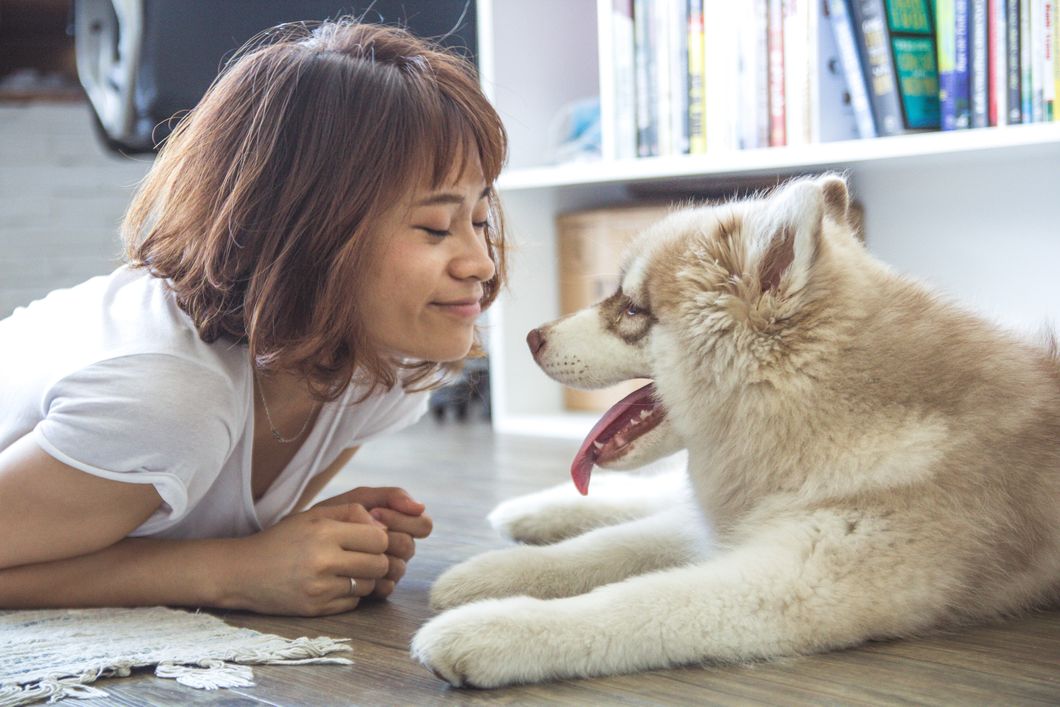Most people get giddy when an adorable dog walks into a room. Dogs are awesome, right? I have a co-worker with a service dog and have learned that when you see one, you should probably back off the puppy love. They aren't there to be smooched by you, they are there to perform a job that could be as significant as saving their owner's life. Here are some tidbits I've learned about handling interactions with service dogs and their owners.
1. Talk to the actual person, not the dog.
For some reason when a cute animal is present, humans change their voices to this high-pitched super mommy sound. If someone walks by with a service dog, don't approach them to tell the dog they're so cute you could just eat them up! No, talk to the owner like a person. If you wouldn't have approached the person without their dog, don't bother interrupting them anyway.
2. Do NOT touch a service dog without explicit permission.
 Giphy
GiphyWould you go up to someone in a wheelchair and poke the wheels or push it in a different direction? That's basically the same thing as approaching a service dog and smushing its face or scratching its ears. You are messing with someone's medical equipment and distracting the animal from being alert and doing its job. Sometimes the dogs are off-duty and can enjoy normal dog time. In that case you're good, but always always always ask first.
3. Not all service dogs wear vests.
The vests make it easy to determine if a dog is a service dog but not all owners make them wear one. Be safe and never assume whether or not you can touch it.
4. Don't ask the owner their life and their dog's life story.
As much as the owner loves their dog, they don't always want to tell you their entire history. Well owners often deal with everyone asking about their disability, the dog's history, and how they came to be where they are now.
First off, do not ask someone what their disability is. Just because you can't tell visually doesn't mean you're entitled to know. That is someone's personal private medical information and the dog shouldn't encourage you to pry.
Second, many people like to discuss dog breeds and how you found them but think about how many times a day people might ask them that. It isn't just the dog that meets visitors that come over for dinner. This dog travels with its owner everywhere.
Sometimes they are simply going to Walgreens for some toothpaste or getting a couple groceries. This is their everyday life. Let them be.
5. The dog owner probably doesn't care about your dog.
 Giphy
Giphy"Oh my gosh, you have a dog - me too!" That's awesome for dog park adventures but if you're in a public place and there's a good chance you're approaching a service dog, there's also a good chance they aren't interested in hearing all about your dog. Of course it depends on your conversation but in general, don't take them having a dog to be an open invitation to share your dog's life story.
6. Service dogs are allowed access EVERYWHERE. Do not question it.
 Giphy
GiphyThere is no place where they are not allowed. It is illegal to refuse a service animal's entry.
7. Owners are not required to supply paperwork or proof of permission for their service animal.
Piggybacking on the previous point, the owner is not required to prove reason or permission to have the animal on site. Does anybody abuse that system? Yes, but if people had to constantly prove that they were allowed to take their medically-necessary service animal, they'd never leave the house.
8. While the dog is always working, it doesn't mean they aren't loved and cared for.
 Giphy
GiphySome people feel pity for service dogs, believing they are always working and don't get to live a free puppy life. That isn't the case. Yes, the dogs are incredibly well trained and strictly taught to protect and whatever specifics necessary, but they do have off-hours and off-days. They get to roll around and play on breaks just like humans.
9. Service dogs are not the same thing as therapy or emotional support animals.
This is where some people (including myself originally) get mixed up. They are not the same thing. Therapy and emotional support animals range from dogs to cats to parrots to more. These animals are trained to comfort and allow interaction with stressed individuals. Service animals are much more strictly trained in what to do should their human have a medical emergency. Whether that be seizures, loss of consciousness, etc., their responsibility is at a much higher stake than a therapy animal.
These dogs are a beautiful gift to people in need. Be mindful of people who live every day with a service dog by their side and respect their privacy and feelings about it.






















